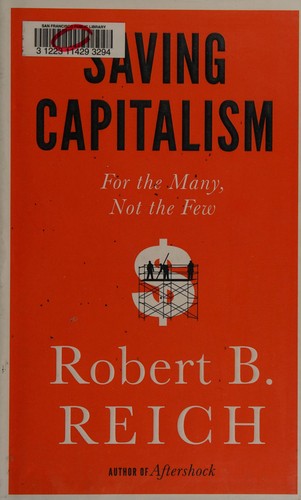Huey reviewed Saving capitalism by Robert B. Reich
Review of 'Saving capitalism' on 'Goodreads'
5 stars
Reich shines the spotlight squarely on the growing income disparity in America. He begins by first attacking the idea of a "free market" as espoused by classical economics. Anyone with a passing interest in economics will be familiar with the limits of a free market and the causes of market failure, but if you aren't, his explanation is useful. He argues strongly against laissez-faire economics, stating that the idea of a free market into which the government "intrudes" is a fallacy and that the argument between free market and government intervention distracts from the real issue. This chapter, aptly titled "The Prevailing View" is a quick summary of the state of economics as it exists in America that anyone.
He then moves on to what can be said to be the pillars of a "free market": Property, Monopoly, Contract, Bankruptcy and Enforcement. Decisions made by the government (representing the society) determine the "rules" of the free market. Reich argues that the rules of the game have been unfairly influenced by corporations and the wealthy- Big Pharma, Big Tobacco, the military-industrial complex, and the elite spend a disproportionate amount on lobbying to change the rules, and other more subtle methods to influence lawmakers and enforcers. Besides lobbying against bills that harm their profits, industrial giants also lobby to limit funds channeled to enforcement agencies, and subtly offer lucrative future employment to lawmakers if their interests are looked after. If a company could spend tens of millions lobbying to block carbon regulations that would cost it hundreds of millions to comply with, the choice is clear.
How is one's pay determined? Reich argues that a person's income has no clear relation to the person's intelligence, character or worth, pointing to the several hundred-fold disparity between the incomes of an entry-level worker and a CEO in a MNC. If that comparison wasn't clear enough, he also questions whether the value added by hedge fund managers, landlords and shareholders truly justifies their capital gains.“The notion that you’re paid what you’re 'worth,' is by now so deeply ingrained in the public consciousness that many who earn very little assume it's their own fault.”
Towards the end he does moderate his indictment of corporations and billionaires, stating that this sorry state of affairs has come about not through organised conspiracy or purposeful manipulation but as a perverse consequence of maximising shareholder value. Companies don't explicitly seek to underpay their workers, monopolise markets for life-saving medicine or grow the income divide- these are simply remarkably consequential side-effects of their profit-maximising behavior.
One particularly damning piece of evidence Reich refers to is a chart of net productivity and real hourly compensation obtained from the Economic Policy Institute, showing a year-on-year increase in net productivity, but a taper off and stagnation for real hourly compensation.
His book is worth a read for those on either side of the aisle, at least for his succinct and insightful arguments for a more egalitarian government and economy and against the undue influence of the moneyed on the government. While his arguments and suggestions clearly merit attention, discussion of possible uncompetitiveness is conspicuously absent. Some of his evidence for a growing income divide, stagnating middle-class wages, the growing ranks of the fully-employed poor could also point to a mismatch of skills and expertise in the economy, and the outsourcing of work to more efficient and competitive foreign economies. Unfortunately, given his staunch leftist stance, it's more likely this book will only serve to vindicate one side and be dismissed by those who should read it most.
Some of his statements viewed in the context of 2017 appear prescient- "It is likely that in the coming years the major fault line in American politics will shift from Democrat vs Republican to anti-establishment vs establishment- that is, to the middle class, working class, and the poor who see the game as rigged versus... [those] who do the rigging."
Saving Capitalism is an excellent guide to the current state of the economy. Dystopian though it may appear, this book is indubitably non-fiction. The chilling picture of corruption and inequality Reich paints is sadly accurate.

